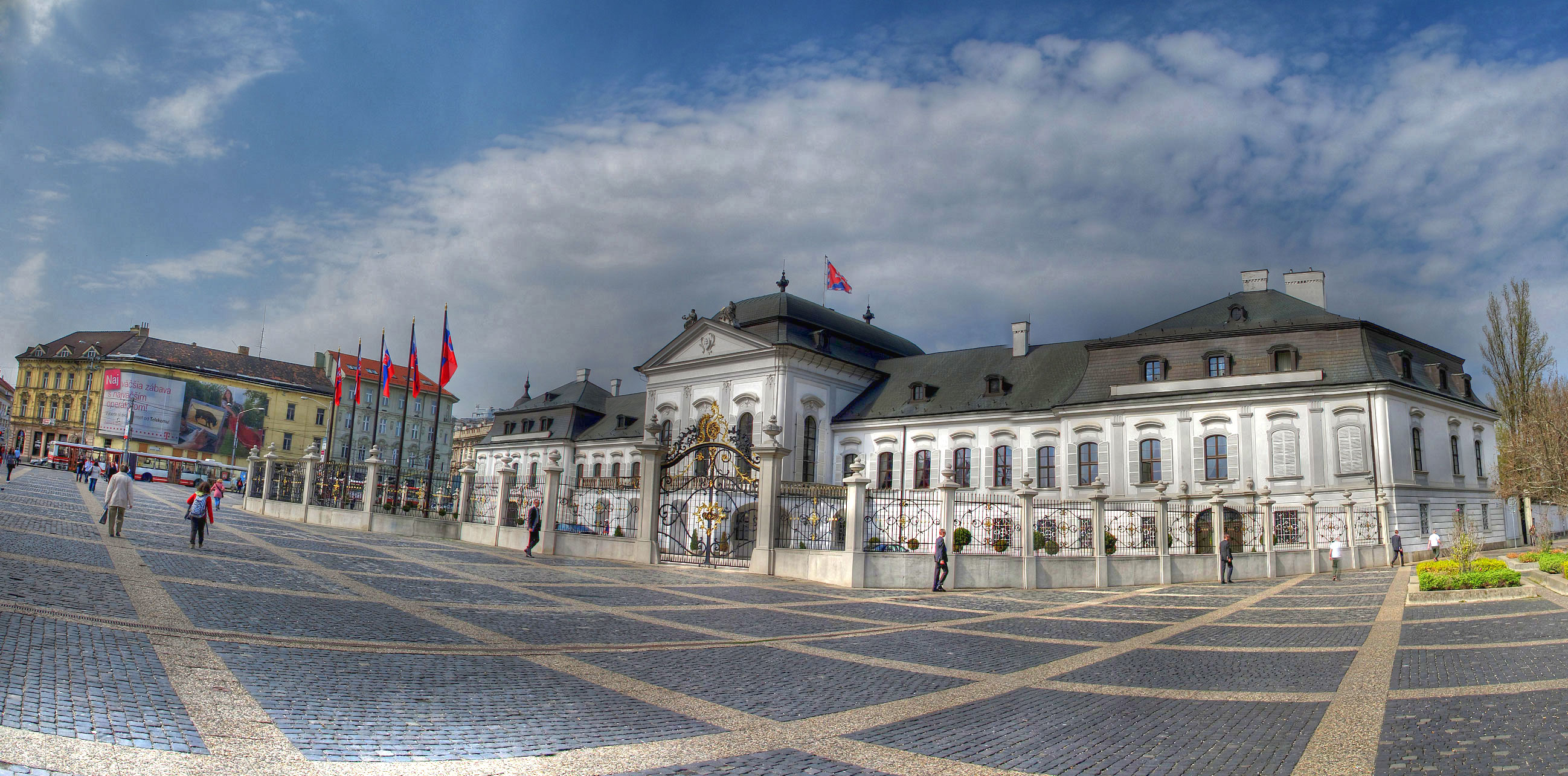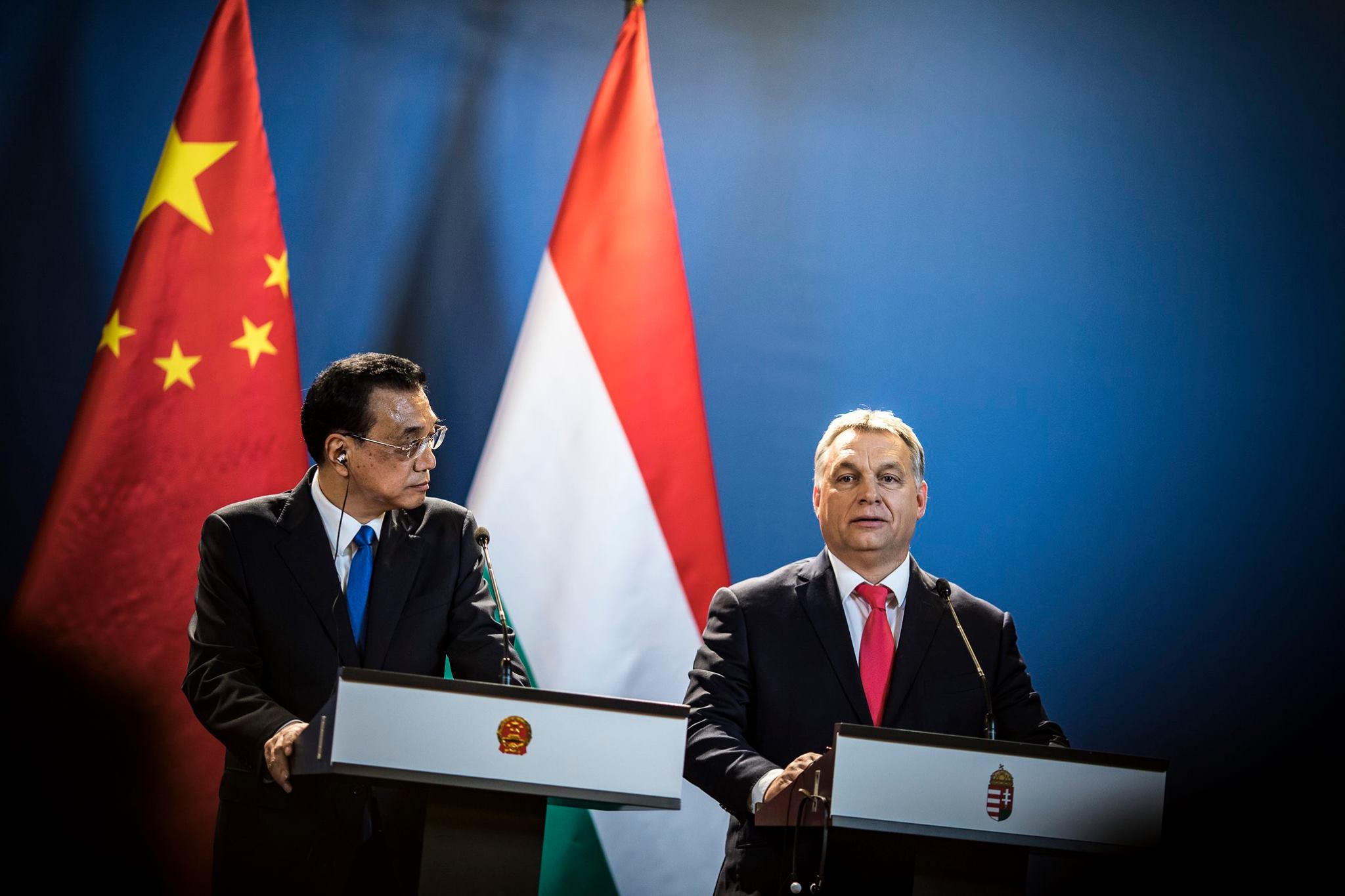Hungary – From Monday to Wednesday, the candidate of the National Rally (RN) in France’s upcoming presidential election was in Budapest to meet with Viktor Orbán and to talk about, among other things, forming a joint parliamentary group in the European Parliament. This meeting heralds the beginning of strengthened cooperation and is part of a reshaping of the European political landscape, where the divide between sovereignists and Eurofederalists is becoming increasingly clear.
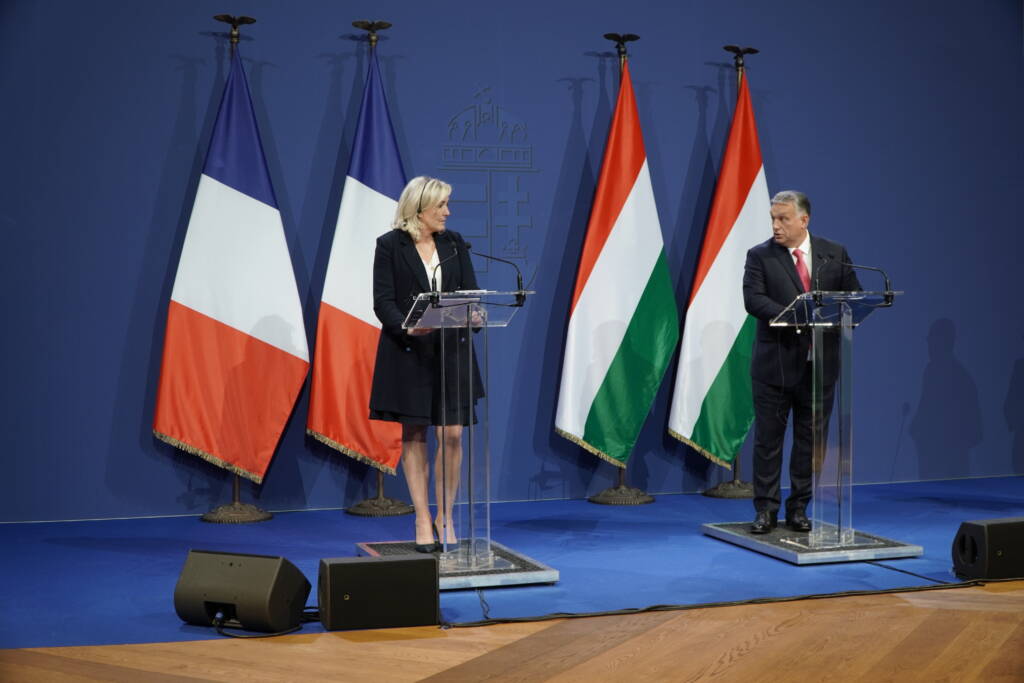
Marine Le Pen received with great pomp by Viktor Orbán
The Hungarian authorities went to great lengths to receive the figurehead of France’s largest party. A police convoy, a security protocol worthy of a reception for a sitting head of state, an official lunch, a press conference as equals: nothing was overlooked to give the best possible welcome to Marine Le Pen. “The way Viktor Orbán received me [is worthy] of a visit by a head of state”, the presidential candidate said in an interview with this author, conducted for L’Incorrect. The welcome was very much appreciated by Le Pen, who said she was “honoured and extremely sensitive” to it.
Asked about the parallel between her visit and that of the not-yet-declared candidate Éric Zemmour (her main competitor on the right wing) a month earlier, she insisted forcefully that Éric Zemmour had been received as a speaker at a symposium, whereas her own visit was political, and therefore not at all of the same nature. As for Viktor Orbán, who was also asked about it, he believes that he has no business interfering in French politics, and that his role is to seek allies for Hungary, not to pronounce on the future democratic choice of the French people.
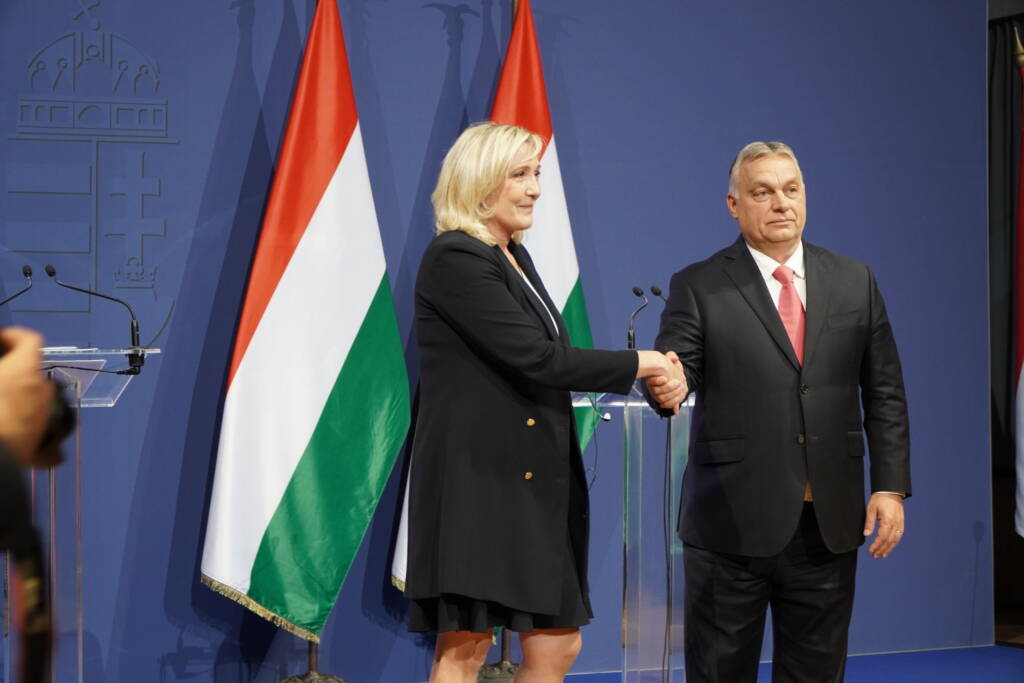
Orbán looking for allies in Europe
However, this seduction operation on the part of the Hungarian government has a clear motive: having left the EPP at the beginning of the year, Viktor Orbán’s Fidesz needs new allies, or rather needs to consolidate alliances at the European level. With the CDU no longer in power in Germany, and for a good number of years to come according to the Hungarian Prime Minister, the European right will change, recompose itself, he explains. From this perspective, the RN is becoming an indispensable ally for Hungary, which is increasingly under attack from the EU institutions.
Marine Le Pen is aware of this, and the end of the “sanitary cordon” policy imposed on Fidesz by the EPP, and in particular by the French LR party, concerning the RN is also good news for her own party. The expected populist tide did not happen in the 2019 European election, but the currently announced recomposition of European sovereignists could nonetheless lead to the formation of a parliamentary group with nearly 150 MEPs, which would make it the second political force behind the EPP, and allow the alter-Europeans to overtake the Socialists in numbers. A joint declaration was issued this summer announcing wider cooperation at European level between various parties currently sitting in different groups.
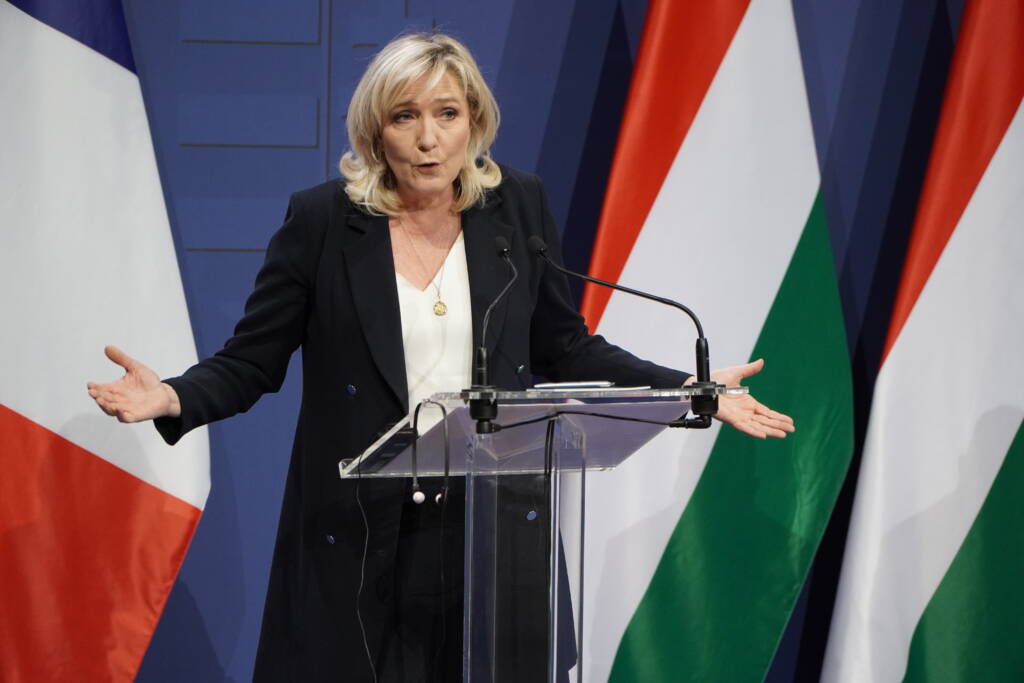
Some obstacles remaining
While Marine Le Pen’s and Viktor Orbán’s joint press conference did not bring any major announcement, and in particular no announcement relating to the creation of the long-awaited parliamentary group, it is to be noted that the Hungarian government, which had been waiting to act pending the German elections, now seems to have a clearer idea of the next German government’s possible composition. This obstacle has been removed, but others remain.
“Sometimes small delegations are afraid to join a very large group, because there are many very large delegations. France, Italy, and Poland have very large groups of MEPs, so there may be a number of other delegations that are afraid of not being listened to. But they are wrong because we really do have a group operation mode that is eminently respectful, as we consider that each delegation is the representative of a nation and not the representative of a few deputies or a percentage”, Marine Le Pen said in reply to my question on the concrete obstacles that prevent the formation of a common group right away. Is she referring to the Hungarians when she mentions the small delegations worried about their fate in this new group to come?
In the face of increasingly aggressive Eurofederalism, whose ideologues are compared by Le Pen to wild animals cornered in a cage, attacking and snarling, the formation of a homogeneous parliamentary group is the objective that she seeks. The “unprecedented violence of the Commission’s statement following the decision of the Polish Constitutional Court is extremely revealing (…) [The European Commission] gives itself powers that it does not have in the treaties. This is a reality. And that is proof of a feverishness. And I see that as a very good sign, actually,” she says optimistically, seeing the growing hostility of liberal forces in the EU as a “last stand”. Marine Le Pen elaborates: “They are all the more aggressive because they feel the wind is changing. And that political forces are rising that will defeat them.”
While common ground can be found in support for a Union founded on sovereignist principles and opposition to the fantasy of a European nation, there are still many subjects of disagreement to overcome. The issue of relations with Russia, in particular, and the corollary issue of relations with NATO, remain sensitive points of contention.
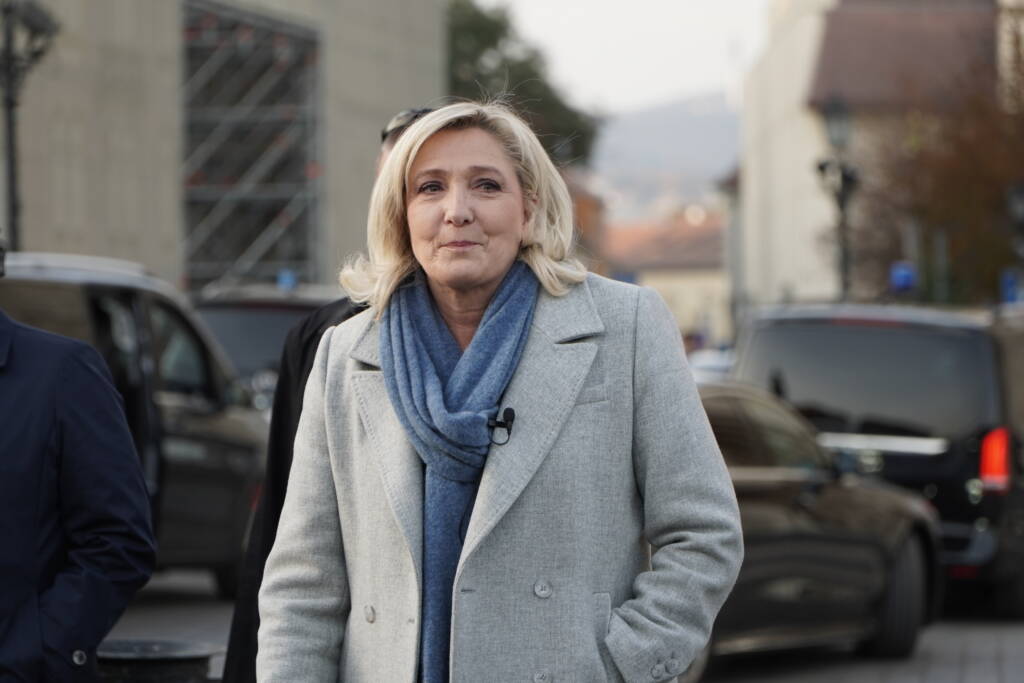
To reform the EU, Marine Le Pen wants to ally with Central Europe
In any case, in the event that she is elected president of the French Republic in April 2022, Marine Le Pen is adamant that France will come to the aid of Poland and Hungary.
Her plan is to impose a reform of the EU on Germany from West and East. Bringing France and the Central European bloc together would provide enough weight within the EU to launch the necessary reforms, says the French presidential candidate. Sweeping aside bluntly “the legend, the fantasy that is the Franco-German couple”, Marine Le Pen believes that it is high time to return to “the European alliance of nations. The aim is for nations to join forces through cooperation that is not forced, that must not be imposed against the interests of the countries.”
Marine Le Pen’s visit to Hungary closes a series of European meetings as during the previous week she had held face-to-face talks with the prime ministers of Poland and Slovenia, whose governments are also being targeted by the European Union. Her position reinforced on the European scene, Marine Le Pen will now be able to refocus on the national dimension of her presidential campaign, where she is currently neck and neck for the second round with Xavier Bertrand and Éric Zemmour, even though the latter are not yet official candidates or nominees for the presidential election.


